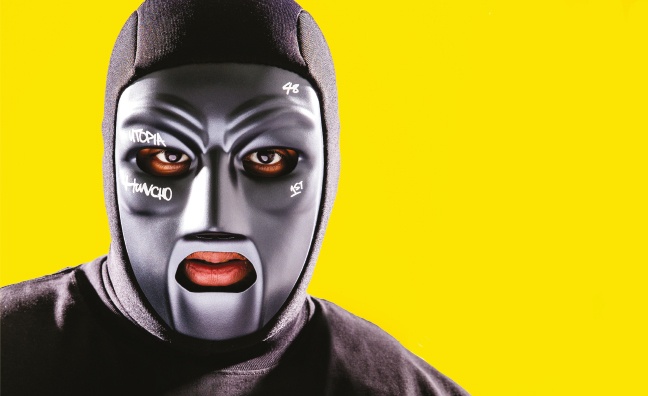M Huncho has told Music Week that he offers something that no other rapper in the UK is able to.
The masked rapper, who keeps his identity a closely guarded secret and is signed to Island, released his debut album Chasing Euphoria last week and starts on the cover of the June edition of Music Week.
Huncho is managed by Niall Bentil at Groundworks and Mixtape Madness co-founder Kwabz Oduro Ayim, who are interviewed alongside Island president Louis Bloom and A&R Adele White in our story.
He broke through around five years ago, and the market has become increasingly competitive in the time he’s been releasing music. Huncho feels that his melodic trapwave sound sets him apart.
“I can do what everyone else can do, but they can’t do what I can do,” he said. “You have to understand how to differentiate yourself, there's a lack of originality. People are just not original, they’re releasing nonsense. The UK is stuck in a place where we like to drain one genre until it’s completely drained. I know I’m original because as soon as you hear my voice getting played from a car, portable speaker or the radio, you know exactly who the fuck that is. That’s how you know that you’ve cemented your name into the game.”
Huncho hit No.5 in January 2020 with his Huncholini The 1st mixtape, which has 89,416 sales according to the Official Charts Company. His previous mixtape, Utopia, hit No.13 in 2019 and has 86,094 sales. At the first midweek count, Chasing Euphoria was at No.6 in the albums chart.
.jpg)
The rapper said that the candid, personal tone of Chasing Euphoria marks a step closer to the mainstream.
“I’ve always had great taste in music, so I studied the people before me and I understood how they went from being street rappers to being artists,” he said. “You can talk about street life, death, drugs, guns and prison, but there comes a point where, as a human being grows up, you want to take your music to a different level.”
He said that Chasing Euphoria, which features Headie One, Potter Payper, Giggs, Ghetts, Wretch 32, BNXN and more, takes his sound to a new level while retaining the characteristics that made his name.
“I make street music, but you’ll hear the difference when I drop street music compared to something that’s personal, has been orchestrated in the right manner and is more relatable to the masses,” he said. “I love making street music, but there’s more normal people than there are people on the streets getting up to nonsense. And it’s always good to relate to the masses.”
Huncho worked on his album cover with UK artist Reuben Dangoor and created a brand new mask for this campaign in collaboration with Lucien Clarke. He said that being the force behind every decision is a key part of brand Huncho.
“I don’t look at the music industry as just making music, I look at it as a whole: performance, how you present yourself, interviews, this and that,” he explained. “I know that gradually building up is better than shooting up straight away. I don’t chase the singles or go to the studio and say, ‘Today, I’m gonna make a song for the radio.’ I’m making music that expresses my feelings. I want to express whatever I want to without people around me telling me what to speak about on the microphone, when I know that if they were in my shoes, they could not do what I do. That’s a fact.”
It's always good to relate to the masses
M Huncho
Huncho said that he takes great joy in confronting naysayers with success.
“I make people doubt me, so I can shut them up, that’s what I get satisfaction from,” he says. “Can I make a better song, sell out a bigger show? Yes! With all of these things, I’ll do them and prove everyone wrong. Someone might look at me and think I’m one of the most successful people they know, but I’ve still got more to learn, room to grow. Sometimes, people think they know you better than you know yourself.”
Huncho also told Music Week about his plans to start a label to cement his legacy in the music industry.
“I’m more than willing to sit down with the big artists in the game right now and make a joint label,” he said. “If I’m the label that you’re signed to, I can relate to you because I know what it’s like. If a label signs an artist and doesn’t give them enough money, they are gonna spend that money and then be back on the streets again, which gives them a bigger percentage chance of either going to jail or dying. It’s about understanding the artists.”
Read the full interview in the new issue of Music Week. Subscribers can read it online here.












